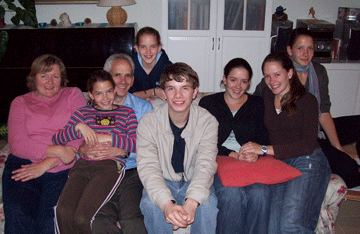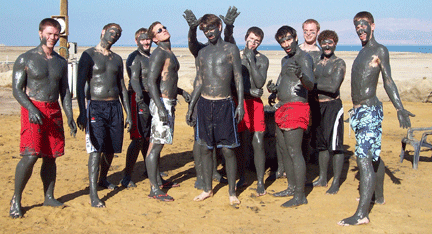End Notes: Plunging into Israelby Spencer Elliott '10 |
| Printer-friendly version | Email this article |
|
I get overwhelmed by a sense of the incomprehensible depth that threatens to envelop me, as if beneath this relatively humble vessel there is an unimaginably large and alien world, and that a simple turn of fate could plunge me into its foreign depths. The situation is out of my control.
My trip to Israel awakened similar feelings.
I grew up in Indiana and, until this trip, I hadn’t left the country. To put it simply, Israel was a trial by fire. I often felt out of place, plagued by a certain disconnect I had never experienced with my culture at home; I was struggling with my naivetª. I wasn’t Jewish or Arab and, honestly, I didn’t sympathize with the endless droves of religious pilgrims (I am a Christian who despises commercialized religion).
Some Americans are privileged with a comfortable lifestyle that affords the opportunity to think purely as individuals. I am one of them. I do not have to take radical stances or form radical groups for the sake of self-preservation. Israel, on the other hand, seemed a diverse state, where many choose to strictly associate with a group that avoids interaction with other segments of the population. So I found myself wandering the streets of Jerusalem in a state of bewilderment.
Overwhelmed by an unseen burden, I felt as if I was alone and afloat in a sea composed of the depths of human history. Time in Israel is measured in millennia, the legacy of only a few individuals survive the test of time; a small nudge (walking in front of a truck, falling off of Mas’ada’s steep cliffs, a suicide bombing) could plunge me into the depths of obscurity.
What brought me out of this negative mind-set and back down to earth? Bargaining in an Arab market; gorgeous landscapes; Turkish coffee; female Israeli soldiers with M-16’s; falafels; mud from the Dead Sea.
One of the first things that struck me as I returned home was the blandness of Indiana’s landscape compared to Israel’s. Then I looked up at the deep blue and fiery orange sky and realzed that the setting of our shared sun was equally gorgeous.
Reprinted from a blog entry by Spencer Elliott ’10, who is the winner of the 2008 Ryan Champion Theater Performance Prize.
Top Photo: Elliott with his Israeli family: Maija-lissa and Michael Elliott, and cousins Shlomit, Shiriel, Tikva, Tohar and Yohanna.
Bottom Photo: Immersion: The mineral content of the Dead Sea is reputed to give its mud therapeutic value, though it’s unlikely these Wabash students left it on them long enough to benefit from it. (below) Sunset over Haifa, Israel.
|

 I can’t endure the open ocean for long.
I can’t endure the open ocean for long.  These provided a temporary fix, but it was spending time with my family that showed me the error of my thought process. My uncle, Michael Elliott, has lived in Israel for 25 years. He met my aunt Maija-lissa (from Finland), got married, and raised five girls—Shlomit, Shiriel, Tikva, Tohar, and Yohanna. Spending time with Israelis with whom I share a strong familial bond made me finally understand that life goes on in Israel much as it does in Indiana. People get up, go to work and come home to their families. Most important, most also desire to peacefully coexist with their neighbors. We will all die and plunge into the afterlife. What counts is how we spend our short time on this earth.
These provided a temporary fix, but it was spending time with my family that showed me the error of my thought process. My uncle, Michael Elliott, has lived in Israel for 25 years. He met my aunt Maija-lissa (from Finland), got married, and raised five girls—Shlomit, Shiriel, Tikva, Tohar, and Yohanna. Spending time with Israelis with whom I share a strong familial bond made me finally understand that life goes on in Israel much as it does in Indiana. People get up, go to work and come home to their families. Most important, most also desire to peacefully coexist with their neighbors. We will all die and plunge into the afterlife. What counts is how we spend our short time on this earth.